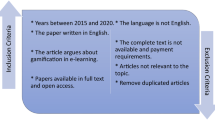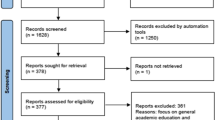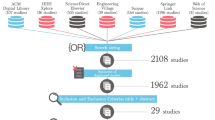Abstract
This paper presents a game designed to support teaching and learning of Portuguese History to 6th grade students. Firstly, a state of the art of mobile game-based learning for History is presented. Then we describe shortly the research carried out which aimed at the analysis of the games most played by students, followed by the identification of the learning principles proposed by Paul Gee and the game mechanics to propose a game structure. Data was collected from students in the 2nd cycle of the Portuguese Educational System (n = 508) through a questionnaire. Finally, we describe the game, that was developed based on those findings, related to a Portuguese historical event - the Republic Implementation in 1910.



Similar content being viewed by others
References
Ardito, C., Buono, P., Costabile, M. F., Lanzilotti, R., & Pederson, T. (2007). Re-experiencing history in Archaeological Parks by playing a mobile augmented reality game. on the move to meaningful internet systems 2007: OTM 2007. Workshops, 4805(2007), 357–366. doi:10.1007/978-3-540-76888-3_58.
Babbie, E. (1997). Survey research methods. Belmont, California: Wadsworth.
Beland, L.-P., & Murphy, R. (2015). Technology, Distraction & Student Performance. London. Available: http://cep.lse.ac.uk/pubs/download/dp1350.pdf [Accessed 20 January 2015].
Blakemore, J. E. O., Berenbaum, S. A., & Liben, L. S. (2008). Gender development. Washington: Hogrefe & Huber Publishers.
Carvalho, A. A., & Araújo, I. C. (2014). Digital games played by Portuguese students: Gender differences. In 2014 9th Iberian Conference on Information Systems and Technologies CISTI, 1–6. IEEE. doi:10.1109/CISTI.2014.6877076.
Cherney, I. D., & London, K. (2006). Gender-linked differences in the toys, television shows, computer games, and outdoor activities of 5- to 13-year-old children. Sex Roles 54(9-10), 717–726. Available: http://link.springer.com/article/10.1007%2Fs11199-006-9037-8#/page-1 [Accessed 5 February 2015].
Douch, R., Attewell, J., & Dawson, D. (2010). Games technologies for learning. London: LNS.
Gee, J. P. (2003). What video games have to teach us about learning and literacy. EUA: Palgrave Macmillan.
Gee, J. P. (2007). Good Video Games + Good Learning: Collected Essays on Video Games, Learning and Literacy. New York: Peter Lang.
Hamari, J., Shernoff, D. J., Rowe, E., Coller, B., Asbell-Clarke, J., & Edwards, T. (2016). Challenging games help students learn: An empirical study on engagement, flow and immersion in game-based learning. Computers in Human Behavior, 54, 170–179. doi:10.1016/j.chb.2015.07.045.
Jeong, E., & Kim, D. (2007). Definitions, Key Characteristics, and Generations of Mobile Games. In D. Taniar (Ed.), Encyclopedia of mobile computing and commerce (pp. 185–189).
Klopfer, E. (2008). Augmented learning: research and design of mobile educational games. Cambridge, Massachusetts: MIT Press.
Kukulska-Hulme, A. (2014). Mobile, wearable, companionable: emerging technological challenges and incentives for learning. In Carvalho, A. A. A, Cruz, S., Marques, C. G., Moura, A.; & Santos, I. (orgs.) (2014). Atas do 2.° Encontro sobre Jogos e mobile learning. Braga: CIEd.
Lee, G. H., Talib, A. Z., Zainon, W. M. N. W., & Lim, C. K. (2014). Learning history using role-playing game (RPG) on mobile platform. In H. Y. Jeong, M. S. Obaidat, N. Y. Yen, J. J. Jong, & H. Park (Eds.), Advances in Computer Science and its Applications (pp. 729–734). Berlin: Springer Berlin Heidelberg. doi:10.1007/978-3-642-41674-3_104.
Lenhart, A., Kahne, J., Middaugh, E., Macgill, A., Evans, C., & Vitak, J. (2008). Teens, Video Games and Civics. Washington, D.C.: Pew Internet & American Life Project. Retrieved from http://www.videogames.procon.org/sourcefiles/teens-video-games-and-civics-pew-research.pdf [Accessed 6 January 2015].
Lucas, K., & Sherry, J. L. (2004). Sex differences in video game play: a communication-based explanation. Communication Research, 31(5), 499–523.
Moura, A., & Carvalho, A. A. (2013). Framework for mobile learning integration into educational contexts. In Z. L. Berge, & L. Y. Muilenburg (Eds.), Handbook of mobile learning (pp. 58–69). New York: Routledge.
Orr, K., & McGuinness, C. (2014). What is the “learning” in games-based learning? In T. M. Connolly, T. Hainey, E. Boyle, G. Baxter, & P. Moreno-Ger (Eds.), Psychology, Pedagogy, and Assessment in Serious Games (pp. 221–242). Hershey, PA: IGI Global. doi:10.4018/978-1-4666-4773-2.ch011.
Perez-Valle, A., Aguirrezabal, P., & Sillaurren, S. (2014). Playhist: play and learn history. Learning with a historical game vs an interactive film. In M. Ioannides, N. Magnenat-Thalmann, E. Fink, R. Žarnić, A.-Y. Yen, & E. Quak (Eds.), Digital Heritage. Progress in Cultural Heritage: Documentation, Preservation, and Protection (pp. 546–554). Cyprus: Springer International Publishing. doi:10.1007/978-3-319-13695-0_54.
Prensky, M. (2006). Don’t bother me mom – I’m learning!’ How computer and vídeo games are preparing your kids for 21st century success – and how you can help! Minnesota: Paragon House.
Prensky, M. (2010). Teaching digital natives: Partnering for real learning. Thousand Oaks: Corwin Press.
Salen, K., & Zimmerman, E. (2004). Rules of play - game design fundamentals. Massachusetts: The MIT Press Cambridge.
Şar, E. (2012). The role of history-themed non-educational computer games on primary school children’ (at grades 6th, 7th and 8th) perceptions of history. Procedia - Social and Behavioral Sciences, 55(0), 776–781. doi:10.1016/j.sbspro.2012.09.563.
Simons, M., Bernaards, C., & Slinger, J. (2012). Active gaming in Dutch adolescents: a descriptive study. International Journal of Behavioral Nutrition and Physical Activity, 9(118), 1–9. Available: http://www.ijbnpa.org/content/9/1/118 [Accessed 6 January 2015].
Sin, N. M., Talib, O., Norishah, T. P., Ishak, A. A., & Baki, R. (2014). Male students and digital game: reason, motivation and feeling. International Journal of Information and Education Technology, 4(1), 6–11. Available: doi:10.7763/IJIET.2014.V4.359 [Accessed 19/01/2015].
Šisler, V., Brom, C., Cuhra, J., Činátl, K., & Gemrot, J. (2012). Stories from the History of Czechoslovakia, A serious game for teaching history of the Czech lands in the 20th century - Notes on design concepts and design process. Lecture Notes in Computer Science 7522 LNCS, 67–74. doi:10.1007/978-3-642-33542-6_6.
Squire, K. D. (2011). Video games and learning - teaching and participatory culture in the digital age. New York: Teachers College, Columbia University.
Terlecki, M., Brown, J., Harner-Steciw, L., Irvin-Hannum, J., Marchetto-Ryan, N., Ruhl, L., & Wiggins, J. (2010). Sex differences and similarities in video game experience, preferences, and self-efficacy: implications for the gaming industry. Current Psychology, 30(1), 22–33. Available: doi:10.1007/s12144-010-9095-5 [Acessed 2 February 2015].
van Rosmalen, P., Wilson, A., & Hummel, H. G. K. (2014). Games for and by teachers and learners. In T. M. Connolly, T. Hainey, E. Boyle, G. Baxte, & P. Moreno-Ger (Eds.), Psychology, Pedagogy, and Assessment in Serious Games (pp. 243–269). Hershey, PA: IGI Global. doi:10.4018/978-1-4666-4773-2.ch012.
Williams, D., Consalvo, M., Caplan, S., & Yee, N. (2009). Looking for gender: gender roles and behaviors among online gamers. Journal of Communication, 59(4), 700–725. doi:10.1111/j.1460-2466.2009.01453.x.
Williamson, B. (2009). Computer games, schools, and young people. A report for educators on using games for learning. Bristol, Futurelab. Available: http://www.nfer.ac.uk/publications/FUTL27 [Accessed 6 February 2015].
Acknowledgment
This research project is funded by FEDER through the Programa Operacional Factores de Competitividade - COMPETE and by national funds through FCT - Fundação para a Ciência e a Tecnologia - PTDC/CPECED/118337/2010.
Author information
Authors and Affiliations
Corresponding author
Rights and permissions
About this article
Cite this article
Cruz, S., Carvalho, A.A.A. & Araújo, I. A game for learning history on mobile devices. Educ Inf Technol 22, 515–531 (2017). https://doi.org/10.1007/s10639-016-9491-z
Published:
Issue Date:
DOI: https://doi.org/10.1007/s10639-016-9491-z




